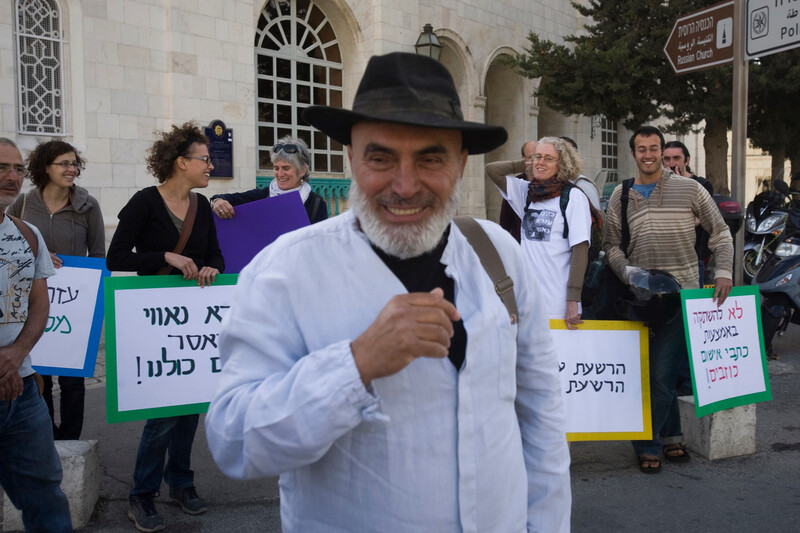Israeli Prime Minister Benjamin Netanyahu is again pushing a proposal to deport Palestinians from the West Bank to the Gaza Strip, despite broad opposition to what would be a violation of international law.
In a March 2 letter, Netanyahu asked Israel's attorney-general to conduct a legal review of the proposal, which would allow families of convicted “terrorists” to be deported. Ynet reported that the prime minister said during a cabinet meeting that he does not agree with “how it [war crimes] is defined in the Geneva Conventions”.
Israel
 Palestinians protest in support of jailed journalist Mohammed al-Qeq
Thirty three-year-old Mohammed al-Qeq, a Palestinian journalist who has being held for more than six months in administrative detention without charge or trial in an Israeli prison, ended a 94 day hunger strike on February 26.
Al-Qeq ended the strike — the longest by any Palestinian prisoner — after Israel agreed not to renew his administrative detention order, which ends on May 21, AFP said that day.
Palestinians protest in support of jailed journalist Mohammed al-Qeq
Thirty three-year-old Mohammed al-Qeq, a Palestinian journalist who has being held for more than six months in administrative detention without charge or trial in an Israeli prison, ended a 94 day hunger strike on February 26.
Al-Qeq ended the strike — the longest by any Palestinian prisoner — after Israel agreed not to renew his administrative detention order, which ends on May 21, AFP said that day.
There has been plenty of heat this Palestinian winter in the campaign for Boycott, Divestment and Sanctions (BDS) against Israel.
There have been some important victories, helped by the increased scrutiny of Israeli state violence since October. And equally, the hysteria from Israeli and Western political establishments over the “threat” posed by the BDS campaign has reached new levels.
After 77 days on hunger strike in protest against his arbitrary detention by Israeli forces, Palestinian journalist Mohammed Al-Qeeq is on the verge of death.
Al-Qeeq is currently in detention in a hospital in the northern city of Afula; his petition to be transferred to a clinic in Ramallah has been rejected by the Israeli government.
His lawyer says he refuses to stay in Israeli hospitals and will only accept medical treatment in the West Bank. He was arrested on November 21 last year on charges of being an activist with the Gaza-based Palestinian resistance movement Hamas.
 Ezra Nawi.
Israel has arrested three human rights defenders amid what appears to be a concerted campaign to sabotage domestic groups documenting Israeli abuses of Palestinians, Electronic Intifada said on January 21.
Ezra Nawi.
Israel has arrested three human rights defenders amid what appears to be a concerted campaign to sabotage domestic groups documenting Israeli abuses of Palestinians, Electronic Intifada said on January 21.
 “Stop the blackmail: Anti-Zionism is not anti-Semitism.” Paris, July 2014.
“Stop the blackmail: Anti-Zionism is not anti-Semitism.” Paris, July 2014.
 Israel has detained at least 1200 children since October 1.
As the latest upsurge in mass Palestinian resistance to Israel's occupation entered its third month, the world marked the International Day of Solidarity with the Palestinian People on November 29.
Israel has detained at least 1200 children since October 1.
As the latest upsurge in mass Palestinian resistance to Israel's occupation entered its third month, the world marked the International Day of Solidarity with the Palestinian People on November 29.
Ownership of the land of Palestine is hotly contested, so it is little surprise that the Earth itself is often the first casualty of Israel's occupation.
 Israeli military jeep broadcasting threat to gas residents, Aida refugee camp, Bethlehem, occupied West Bank, October 29. Still from video by Yazan Ikhlayel.
Israel has introduced dramatic new restrictions on Palestinians living in the city of Hebron in response to recent violence and mass resistance in the occupied West Bank.
Israeli military jeep broadcasting threat to gas residents, Aida refugee camp, Bethlehem, occupied West Bank, October 29. Still from video by Yazan Ikhlayel.
Israel has introduced dramatic new restrictions on Palestinians living in the city of Hebron in response to recent violence and mass resistance in the occupied West Bank.
Israel is carrying out summary executions of Palestinians, Amnesty International has confirmed. Sometimes it lets injured Palestinians bleed to death.
The human rights group says it has “documented in depth at least four incidents in which Palestinians were deliberately shot dead by Israeli forces when they posed no imminent threat to life, in what appear to have been extra-judicial executions.”
Israeli occupation forces executed an injured Palestinian in Hebron on October 29, an eyewitness told Electronic Intifada on October 30.
Video corroborates this clear case of extra-judicial execution, a war crime and part of a pattern of such killings of Palestinians by Israeli forces.
Last month, 71 Palestinians had been killed according to the Palestinian Authority health ministry on October 30.
This number includes five Palestinians who died as a possible result of tear gas inhalation, delayed medical treatment due to checkpoints and medical neglect by prison authorities.
Once again, the United States and Israel voted against a motion to end economic sanctions at the United Nations General Assembly on October 27. Similar motions have been adopted by overwhelming majorities at the UN for the past 23 years.
UN Secretary-General Ban Ki-moon presented a report that concludes that the economic sanctions, which have caused about US$833.8 billion in damages to the Caribbean island, should be lifted.
Cuban foreign minister Bruno Rodriguez addressed the UN, calling the blockade a “flagrant, massive and systematic violation of human rights of all Cubans”.
- Previous page
- Page 11
- Next page





